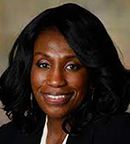Evidence shows that early detection and treatment of cancer can significantly improve health outcomes. However, women in Mississippi—particularly in underserved populations—experience high rates of late-stage cancer diagnoses.

Michelle Williams, PhD
A report published by Michelle Williams, PhD, and colleagues in the Journal of Cancer Education evaluated the feasibility of offering free, same-day cancer screening and health education to reduce disparities in preventable cancers. The research team evaluated the effects of providing access to free mammograms, Papanicolaou tests, pelvic exams, and oral cancer exams on participants' knowledge about cancer, self-efficacy for obtaining health care, and intentions to change their health behaviors.
See, Test, & Treat Program
Dr. Williams and colleagues evaluated an implementation of the See, Test, & Treat Program, an evidence-based program developed by the College of American Pathologists (CAP) Foundation that they adapted for use with uninsured and underserved women in the Jacksonville, Mississippi, metropolitan area. See, Test, & Treat participants were educated about cancer screenings during their consultation with providers.
Important features of the See, Test, & Treat program were that participants received screening results within 2 hours, and participants who received abnormal results were able to schedule a follow-up appointment at a Federally Qualified Health Center before leaving. In addition, upon arriving at the screening site waiting room, participants could choose from a variety of healthy activities, including demonstrations of healthy cooking, yoga, and Zumba.
Participants learned of the program from advertising disseminated through channels such as churches, health-care centers, and social media. Childcare was made available for participants with young children. The American Cancer Society guidelines were used to determine eligibility for the breast and cancer screening. Seventy-two women met the eligibility requirements, 53 women were screened, and 52 participants completed the evaluation survey.
Follow-up appointments were made for all participants who received abnormal test results, including 18 women who received abnormal mammogram results. Fifteen of the 18 women obtained a diagnostic mammogram, 3 of whom required biopsies. All the biopsy results were benign. Two of the women who received the oral cancer exams had abnormal results, and both were referred for treatment. None of the 44 Papanicolaou tests were abnormal; however, 14 women were diagnosed with trichomoniasis and referred for treatment.
Overall, the program was positively received by the participants and successfully provided uninsured and underserved women with free cancer screening and health education. When asked about what they enjoyed most about the program, participants identified the convenience of same-day screening results and that the staff treated them with respect. Most reported that the program had a positive effect on their knowledge of cancer screenings and their self-efficacy for seeking regular checkups. In addition, participants reported that the health education activities had a significant effect on their understanding of the cancers for which they were screened, as well as general health, nutrition, and exercise.
Limitations of the evaluation approach include the lack of long-term follow-up because the evaluation survey was completed anonymously. Dr. Williams seeks to include an interview and follow-up survey of all participants in future iterations of the program.
"Cancer screenings are a valuable tool for the early detection of cancer. However, uninsured and underserved women may lack access to life-saving routine screenings. Evaluating the implementation of this program helps show that it is feasible to provide access to free cancer screenings to vulnerable populations and to provide screening results in the same day," said Dr. Williams, Associate Professor at George Mason University's College of Health and Human Services Department of Global and Community Health.
Disclosure: For full disclosures of the study authors, visit link.springer.com.

